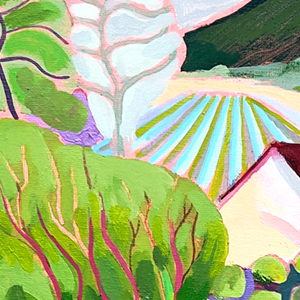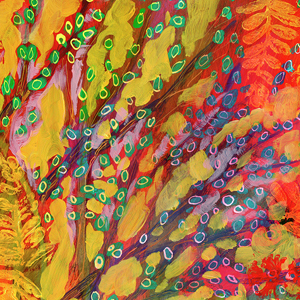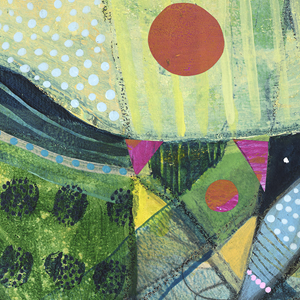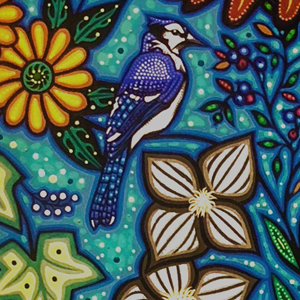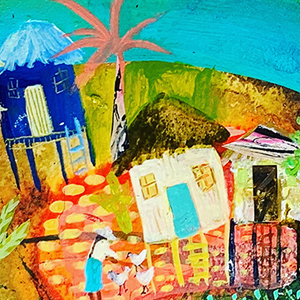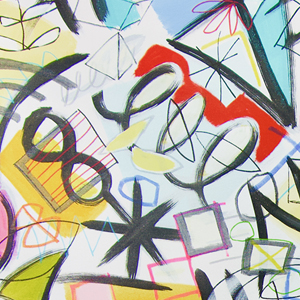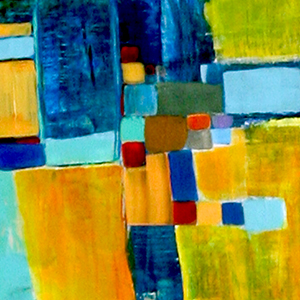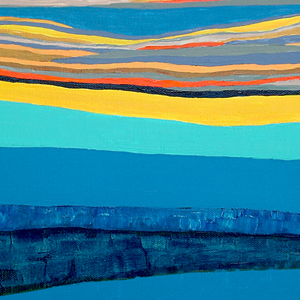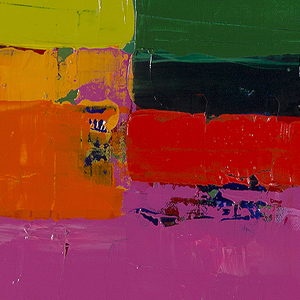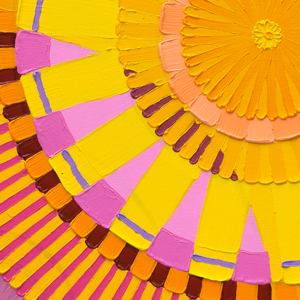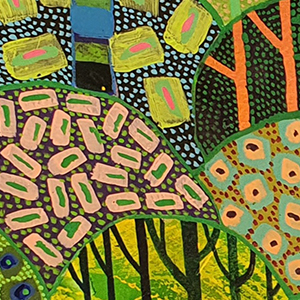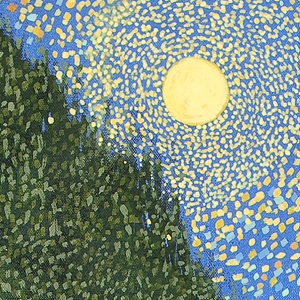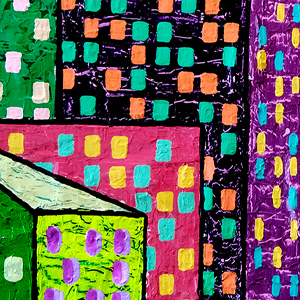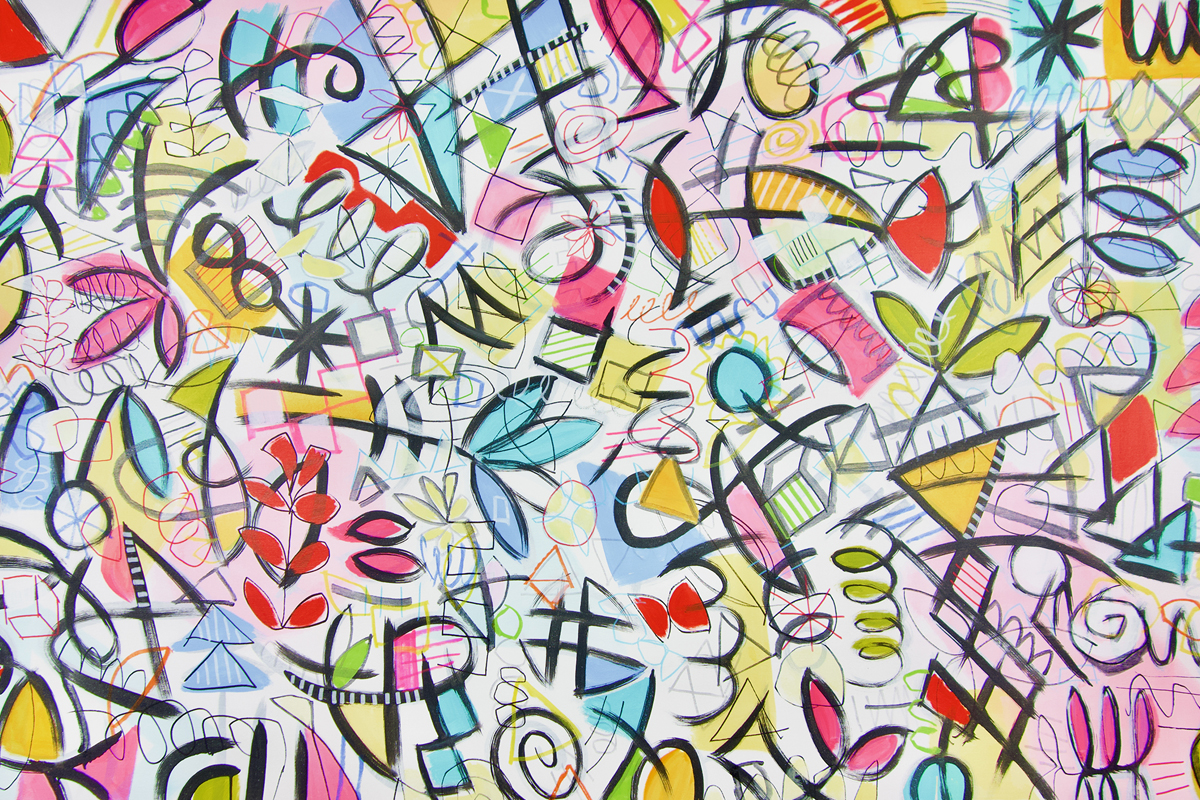
Abundant Virtue
Why?
On our Failures of Imagination to Accomplish Dignity for All
Dirk Philipsen
Artwork: “Just Listen” by Michelle Louis © 2021
It’s a fool’s errand even to attempt to keep up with all the profound changes in the world these days. Yet one thing seems almost undeniable: both dangers and opportunities have reached unprecedented levels. Paying attention engenders both despair and hope.
The signposts of despair are quite familiar—war, conflict, escalating inequality, climate change, species extinction, dysfunctional governance systems. Less familiar, but equally pervasive, are signs of hope and promise: acts of tremendous kindness and generosity, technologies that make possible a regenerating ecosystem, peaceful co-existence within economies focused on wellbeing rather than wealth accumulation, innovative concepts of organizing shared resources or helping people escape debt and dependence.
Here we are—facing existential threats at a time of unmatched collective potential. This, to me, raises a fundamental question: with all the wealth and expertise generated worldwide, why can’t we, as a global community, manage to provide every human being with a life of dignity? A life where basic needs are met, and people feel respected, safe, and supported. A life of mutual generosity, free from the constant worry of securing sustenance, shelter, and safety. A life that fosters strong family and community bonds, and offers a sense of belonging. And, crucially, a life that’s sustainable, and doesn’t ruin the ecosystem our collective lives depend on.
The greatest tragedy might well be this: we collectively don’t lack resources, but vision. At this point, it seems hard to deny that there is enough to allow everyone a dignified existence on the planet, yet our political systems are stuck in a rut, unable to imagine a better future. Not only are our leaders failing to deliver on the promises of progress, but they’re also barreling ahead with policies that put our very survival at risk.
To give but one prominent example: while politically informed citizens around the world worry, with good reason, about the rise of nationalist right-wing ideologies, there is almost no conversation about the fact that, from left to right, virtually all political groups and parties continue to promote what may well be the most dangerous of all ideologies: the idea of infinite exponential economic growth. On a most obvious level, the consequences of climate change won’t discriminate between the wealthy and the poor for long; a ravaged and burning planet won’t spare those with privilege—their mansions on the hill will only survive a few agonizing moments longer. Thinking that we can exponentially grow forever, or even that this is somehow desirable, is a catastrophic failure of imagination, and it’s putting the entire human experiment in jeopardy.
For thousands of years, visionaries from artists to philosophers to reformers have imagined a future where every individual can thrive and reach their full potential, unhindered by circumstance or background. Today, this vision is no longer a distant dream; it’s a pressing imperative. But it’s not something we can achieve by solely championing individual rights, much less is it a vision that can be accomplished through endless growth.
Instead, we must acknowledge that individual wellbeing is inextricably linked to collective wellbeing, to the greater good. We depend on each other. As human beings and members of diverse communities we thus don’t just have rights, but also responsibilities—to each other, to our families and communities, and to the world at large. Indeed, replacing greed and short-term thinking with generosity and a focus on the longer-term common good is imperative for our collective survival.
In large part, the structures we build make us who we are, and what we can do. If one lives in a typical modern city built around the needs of cars, not people, for instance, advocating for the rights of pedestrians or cyclists won’t save you from being run over and killed nor from having to own a car yourself, any more than it protects children from respiratory ailments or the loneliness of a cul-de-sac. Worldwide, it has become almost impossible to escape the grid, highlighting the urgent need to interrogate and reimagine the systems that shape our lives.
And yet, we collectively continue to pile up amazing accomplishments—social and technological breakthroughs previously deemed unimaginable. We explore space and the deep seas and the nucleotides of the human body; we have more than enough to feed and house and educate every human on earth; we have more access to knowledge in our pockets than rulers had in their entire empires. Pretty amazing, all this.
Given such achievements, it’s astonishing that humans haven’t realized universal dignity. Visionaries like Adam Smith, Mahatma Gandhi, John Maynard Keynes, and Vandana Shiva all wrote that a state of abundance and dignity for all was within grasp, driven by human innovation and ingenuity. Yet, here we are, still grappling with poverty, precarity, and conflict. The disconnect between their hopeful visions and our harsh reality is jarring.
Why?
Our planet is as beautiful as it is rich in bounty and diversity. It originated some 4.54 billion years ago. Translated into a year, as Carl Sagan brilliantly showed, we’ve lived on earth for less than a full hour of its existence. It took us less than a minute to alter or destroy much of it. This reality—what some call climate crisis or ecological collapse and the academics among us have named the Anthropocene or the Capitalocene—is not so much a threat to the planet as it is a threat to human existence.
Young people in the 1970s stated this in founding Earth Day, just as members of Generation Z repeatedly invoke Indigenous thinkers today: we do not own this planet; rather, we are products of it. Inescapably, we are intertwined with it. We rely on it for all the essentials—food, water, sustenance. We are not mere inhabitants; we reshape its intricate web. Within us lie echoes of the universe’s inception, shared microbial companionships with every living entity gracing our shared home, and a genetic kinship that binds us not only to one another but also to creatures as diverse as fruit flies and bonobos, our nearest biological relatives.
As humans, we’ve long believed we’re exceptional, but the truth is, we’re not the only ones who feel, think, plan, or wield tools. What sets us apart, however, is the astonishing duality of our nature. On one hand, we’ve created an incredible diversity of beauty and creativity – in art, music and literature, but also in culture and technology. On the other hand, we’ve unleashed unprecedented destruction—ravaging the planet, exploiting resources, and inflicting suffering on a massive scale, particularly over the last five centuries.
But the debate over human nature—are we inherently violent and selfish or cooperative and loving?—obscures a more fundamental question: who benefits from these debates? The emphasis on selfishness and violence can justify authoritarianism and exploitation, while the emphasis on cooperation and kindness can empower collective action and democracy. But what if the real question isn’t about our alleged nature, but about our political choices? Who or what sets the rules of governance? Can we, as philosophers throughout the ages have asked, govern ourselves? Is generosity, perhaps, not just an individual choice, but something we can bake into the DNA of modern societies?
By shifting the focus from our supposed nature to our political choices, we can begin to challenge the systems of power that shape our world. The key to unlocking our potential for self-governance lies in recognizing that our capacity for collective decision-making is not fixed, but depends on the systems and structures we build. By securing a life of dignity for everyone, we can create institutions and cultures that incentivize cooperation, generosity, and collective decision-making. Rather than a question of human nature, it is a question of what kind of society we want to build – and how we can build it together.
The historical record offers a rich tapestry of tools and insights, woven from the threads of courageous resistance and visionary thinking. From Siddhartha Gautama’s radical renunciation of the caste system’s oppressive hierarchies, to Martin Luther’s bold challenge to the church’s monopoly on divine authority, to Adam Smith’s advocacy for the market’s liberating potential over the stifling rule of monarchs and nobility, to Chief Pontiac’s defiant rejection of European colonizers’ claims to Indigenous lands, to Thomas Paine’s clarion call for the people’s ultimate political authority, to Mary Wollstonecraft’s fierce insistence on women’s autonomy and self-determination, to Karl Marx’s passionate belief in workers’ rightful ownership of wealth, to Greta Thunberg’s urgent call for leaders to abandon the fairytales of eternal economic growth and confront the stark realities of our planetary crisis—the struggle over the shape and direction of societal progress revolves around a single, pivotal question: who should wield control over our destinies?
This question has echoed through the ages, a persistent refrain of resistance and rebellion, of vision and transformation. It is a question that challenges the status quo, that disrupts the comfortable certainties of power and privilege, that demands we confront the injustices and inequalities that have long been embedded in our societies. And it is a question that invites us to imagine a different future, one in which the control over our destinies is wrested from the grasp of presumed human nature and the incapacitating logic of profit maximization. What if societal progress was determined by the collective wisdom and creativity of all?
Throughout history, individuals have asserted vast privileges, often using grand designations like emperor, king, or lord, sometimes titles in more pedestrian clothing like president or chairman—or simply “men.” But this isn’t just a story of power-hungry individuals seizing control. To legitimize their authority, they needed a solid foundation—one that could be used to coerce others if necessary.
And that foundation was built on exclusive claims to land and wealth, often acquired through conquest, war, or outright theft. The formalization of this plunder into law, and its validation as private property, is a defining feature of both eastern and western civilizations. Meanwhile, those without access to wealth and land have struggled to make ends meet, relying on others for work and income, and often denied political power and basic rights.
The more the privileged few tightened their grip on ownership and control, the louder the question echoed among the many: why should resources be hoarded by a select few when they could be shared by all? Why should a dignified life be a privilege reserved for the powerful when it could be a fundamental human right? The Luddites, indigenous communities, labor advocates, and social justice champions have all challenged the castle’s rule, demanding a world where access to resources, dignity, and a decent life is a basic human entitlement, not a privilege reserved for those born into wealth or power.
And yet, despite the courage and conviction of those who dared to challenge the status quo, movements and uprisings aimed at dismantling the castle system have been met with brutal force or coerced compromise. From the peasant uprisings in Europe between the 14th and 16th centuries to the Arab Spring of the early 2010s, countless movements have been forced to settle for a corner in the very castles they sought to overthrow, with revolutionaries often becoming the new lackeys, perpetuating the same structures they initially sought to dismantle.
The rare exceptions, such as the Russian and Chinese Revolutions, have shown us that even when the castles are seized, the new rulers often maintain the same oppressive systems, merely replacing the previous elite. The quest for a robust framework ensuring fundamental dignity for all remains an elusive dream for humanitarians worldwide. In most cases, the castles still stand, and the powerful few continue to reign.
It’s no wonder, then, that the dominant voices in today’s political discourse dismiss the idea of a world without entrenched power structures as naïve or dangerously idealistic. The most potent tool of power lies in constraining the imagination of those it governs, as the cultural historian Saidiya Hartman so aptly put it: “So much of the work of oppression is policing the imagination.”
Still: what is most remarkable, despite all defeats and setbacks, is that the central intent of liberation movements has remained the same for centuries: to dismantle the reign of the castles so that everyday commoners can thrive alongside their neighbors. Not just claim a room in the castle but get rid of the idea of castles. Not just get a sliver of the stolen loot but stop the theft. Not just settle for a vote on the board but open the doors for self-governance.
The vast majority of people worldwide hold values of fairness, peace, and generosity that their governments systematically disregard or suppress. This disconnect is evident everywhere. Most people approve of inequality in the range of 1 to 5, but live in stark realities that often exceed 1 to 5,000. From Turkey to Peru, and from the United States to South Africa, people are united in their demands for climate action, accessible education, labor rights, and dignity for all. They fight for body autonomy, reproductive rights, and peace. But despite these efforts, governing institutions continue to fail the people they claim to serve, perpetuating inequality, assaulting fundamental freedoms, and sacrificing them on the altar of megalomania, territorial expansion, and economic growth.
Whether they be capitalists, communists, militarists, democrats, or autocrats, they have failed to represent the people they are supposed to serve. This chasm between the values of the many and the actions of the few is a millennia-old indictment of those who hold power. It’s also a stark reminder that the many have yet to find a way to safeguard their values and accomplishments against the few who seek to undermine them.
But it’s also a testament to the resilience and determination of citizens worldwide, who continue to organize for a livable future, and who refuse to be silenced. Their unwavering commitment to the ideas of basic fairness is a beacon of hope, illuminating the path toward a world where universal dignity—a culture defined by generosity, not greed—may someday be recognized not just as a dream, but the best, and, indeed, only realistic path forward.
Wellbeing and generosity aren’t just about providing a safety net for those left behind; it’s about ensuring everyone has a fair chance. It’s not about handouts, but about handoffs—providing all humans a solid foundation for success, from one generation to the next. By addressing the causes of inequality, we can create a world where everyone has the chance to flourish and develop their potential, not just survive.
The notion that such an idea may appear difficult to grasp, even fantastical, speaks more to the ideological policing of our present world than to any insurmountable practical hurdles in bringing it to fruition.
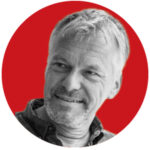 Dirk Philipsen is an economic historian and political economist at the Sanford School of Public Policy at Duke University and the Department of History at Duke. He also serves as Senior Fellow at Duke’s Kenan Institute for Ethics and is director of both the Regenerative Futures Lab and the Build a Better World Focus program. His work and teaching are focused on underlying structural requirements for the wellbeing of people and the planet. His latest book, published in 2015 by Princeton University Press, is The Little Big Number—How GDP Came to Rule the World, And What to Do About It. For an overview of his current work, please see “Economics for the People” at aeon.co.
Dirk Philipsen is an economic historian and political economist at the Sanford School of Public Policy at Duke University and the Department of History at Duke. He also serves as Senior Fellow at Duke’s Kenan Institute for Ethics and is director of both the Regenerative Futures Lab and the Build a Better World Focus program. His work and teaching are focused on underlying structural requirements for the wellbeing of people and the planet. His latest book, published in 2015 by Princeton University Press, is The Little Big Number—How GDP Came to Rule the World, And What to Do About It. For an overview of his current work, please see “Economics for the People” at aeon.co.
Fall 2024
Part I: Abundant Virtue
Laurie L. Patton
Sarah A. Schnitker
Patricia Snell Herzog
Melissa Fitzpatrick
Dirk Philipsen
Interlude: Generous Eyes, Radical Love
Fr. Martin Lam Nguyen, CSC
Part II: Abundant Vocation
MORE





